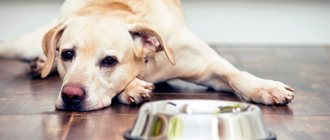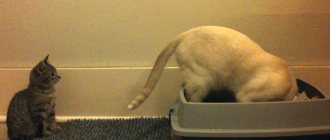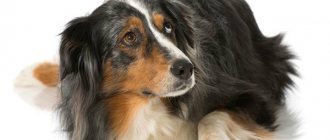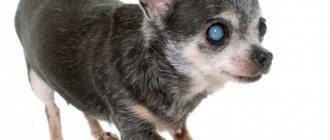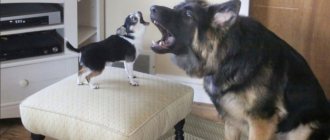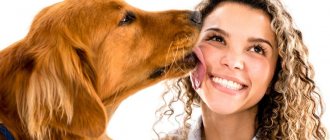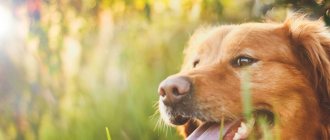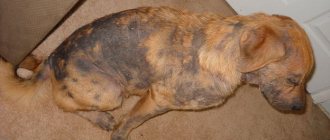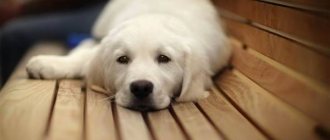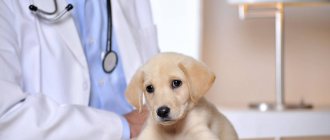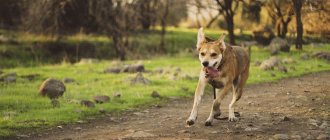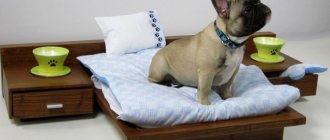Causes
The exact causes of the pathology are unknown. All existing versions are not confirmed by official research. Coprophagia is considered a normal variant in lactating bitches who keep their puppies clean. It occurs in puppies, most likely as a way of understanding the world and forming intestinal flora (feces contain the necessary bacteria).
There is a hypothesis that dogs eat feces due to a lack of nutrients in the body. For example, experiments have shown that a lack of thiamine leads to coprophagia.
Take the Attention Test! Find 10 differences! (click right here!)
Find the answer Are you bothered by some problem or question? Enter “Breed” or “Name of the problem” into the form, press Enter and you will find out everything about the issue that interests you.
This is an atavism that has been preserved from a long time ago, when such behavior was normal for dogs examining the excrement of their offspring.
Other possible reasons.
- Attention deficit. Lack of emotional communication with a person, the owner’s rude attitude towards the dog lead to problems in the relationship between the owner and the animal. Coprophagia is demonstrative behavior, a way to attract attention.
- Environment poor in incentives. If an animal’s walks are monotonous or it is kept in inappropriately limited conditions and is given little exercise, then coprophagy becomes a way to entertain oneself.
- Hunger. A hungry animal in search of food may begin to eat feces, especially the feces of animals with fast digestion. The excrement contains the remains of undigested food.
- State of stress or anxiety. Coprophagia caused by this condition may be temporary if the causes of anxiety are eliminated. If the dog lives in constant stress (for example, due to cruel treatment), then the pathology only gets worse.
- A game. Coprophagy begins as a game, when the animal explores everything around and tastes all the objects it finds.
- Imitation of other animals. If there are other pets in your house who eat feces, or the dog sees similar behavior from others on the street, it may begin to repeat after them.
- Helminthiasis. Sometimes infection with worms leads to a perverted taste.
Pathologies can be caused by diseases of the gastrointestinal tract and pancreas.
Unlike people, whose pathology is always associated with mental disorders, dogs eat feces due to external or internal factors not associated with a serious illness.
Coprophagia is more common in dogs purchased from pet stores than in those purchased from professional breeders.
The danger of habit
Regularly eating feces threatens the development of a number of dangerous diseases:
- Helminths. Intestinal parasites lead to metabolic disorders and digestive problems. A large accumulation of them often leads to blockage and rupture of the intestines, which entails the death of the animal.
- Parvovirus enteritis is a disease that makes the blood “cold.” A deadly and contagious viral infection that most often affects young individuals. The most insidious is the intestinal form of the disease.
- Jaundice (leptospirosis). In this case, liver destruction occurs. The disease progresses rapidly in puppies and elderly dogs. Death can occur 12 hours after infection.
- Toxoplasma. A serious disease that is practically impossible for individuals over 7 years of age to cope with. There are no drugs that can completely defeat the intracellular parasite. The dog becomes a carrier of the disease for the cat. This parasite develops most rapidly in her gastrointestinal tract. And, given the habit of cats to lick their fur, it is not difficult to guess that the next victim of the disease will be a person.
Treatment
Coprophagia, not caused by errors in care and violations of living conditions, does not harm the dog’s health, but is very annoying to the owner.
Determining the cause will help in prescribing effective treatment. Attempts by owners to solve the problem on their own with the help of punishments and prohibitions usually do not lead to results, but only aggravate the situation, contributing to the formation of fear in the animal. You cannot punish a dog. Firstly, she does not always understand why she is being punished, and secondly, such behavior of the owner may be perceived by her as a way of showing attention. Cruel punishments will lead to bad consequences in the pet's behavior.
It is possible to use products that cause disgust in your pet (mustard, pepper, horseradish). They are used to treat feces or add them to the food of a dog whose feces are of interest to others. The method is not particularly effective, since more often the dog eats feces accidentally discovered on the street.
There are 3 options for host behavioral strategies:
- Prevention (the possibility of finding and eating feces is eliminated by using restrictions: walking on a leash and muzzle, keeping the animal in an enclosure.);
- Repurposing (a method based on distraction using a favorite treat or toy);
- Response replacement (teaching an alternative behavior: for example, the “sit” command while making eye contact).
Pills
Dogs suffering from coprophagia are dewormed for preventive or therapeutic purposes if parasites are detected in stool analysis. If coprophagia is caused by other diseases, then medications are prescribed to treat the underlying disease (for example, chronic pancreatic insufficiency).
There are tablets for eating feces - Excel Deter. Brewer's yeast and vitamins contained in the tablets normalize vitamin and mineral metabolism. And garlic and pepper, which are part of the drug, give feces an unpleasant taste and smell. With this type of therapy, the dog stops eating feces. Taking pills does not solve the problem of eating other people's excrement.
Analogue drugs: Pleasant Breath Plus, Nutri-Vet “For eating excrement”.
Vitamins
Nutrition should be balanced. It is better to give food designed for your pet: breed, size, age. Feed the animal regularly. Better more often, but in small portions. If you feed your pet regular food, give vitamin and mineral complexes: 8 in 1 Excel (Excel), Multy Vitamin Small Breed (for small breeds), Canvit, Gelabon Plus, Beaphar and others.
You can use the Grau Sanofor dietary supplement to improve digestion.
Grau Sanofor is a natural product created from the simplest plant organisms. They were turned into medicinal mud during the fermentation process. Sanofor contains about a hundred different biologically active substances that help eliminate problems associated with diseases of the gastrointestinal tract. It is a natural source of vitamins, acids and microelements. The drug combines the functions of a prebiotic, probiotic and sorbent.
With an integrated approach and proper treatment, coprophagia can be eliminated.
How to stop a dog from picking up everything
So, let's look at what measures need to be taken to independently solve the problem associated with your dog eating poop:
- First of all, exclude the very possibility of four-legged animals eating their own or other people’s piles. Keep your house clean and remove your pet's waste on time. If your tail is “walking itself” in a country house, then the piles should be removed on the site itself.
- If your pet is forced to be alone for a long time, provide him with enough toys and treats so that he has something to do alone without turning his attention to poop out of boredom.
- Never punish an animal for puddles or piles of poop if he made them in the apartment. Physical punishment is not only useless, but also completely ineffective.
- Never yell at your pet, much less poke your nose into a pile or puddle. This can lead not only to loss of smell (and this is the dog’s most important organ of communication with the outside world), but also to misunderstanding. Punishment often does not do any good, but on the contrary, it frightens the dog, forcing it to get rid of its feces by eating it so that the owner does not scold him.
- If you catch a dog eating feces, then under no circumstances chase or coax it. If your dog eats poop right in front of you, here's what you need to do. Clap your hands loudly, shout a prohibiting command, throw a leash, a bunch of keys (but not at the dog). When your pet unexpectedly “breaks away” from what he’s doing, call him over, force him to carry out some command, and after executing it, praise him and give him a treat.
- Give your dog more exercise both at home and outside. Play with your dog, learn commands, do exercises, teach your pet to carry a toy in its teeth. Do not give the animal time or reason to sniff out poop. By the way, read about what to do with your four-legged pet.
- Teach your tailed obedience. Learn the prohibiting command “Fu!” As soon as the dog becomes interested in the “find,” strictly say “Ugh!” and pull the leash. Repeat the exercise as often as possible. Even if the dog quickly learns the lesson, never lose attention or lose patience. If you are consistent and persistent in the learning process, then the command should work immediately. Read about basic obedience skills, the very first and most important commands in the life of a four-legged animal.
- Do not forget to praise the animal at the first positive result, give it a treat. The dog should feel loved and needed.
- Put a muzzle on your tailed dog. Choose a model that does not give him the opportunity to pick up something from the ground, but does not interfere with normal breathing.
Just because your dog eats poop doesn't mean it's a bad dog. The thing is that our furry creatures, wanting to explore the world around them, begin to taste and taste everything. The dog is not to blame, he obeys natural instincts. And our task is to wean him from this habit in order to preserve the health of your beloved pet.
Prepare before going to the vet
In the office, you may have to provide the veterinarian with all possible assistance (hold the animal while they take blood for analysis, give an injection, extinguish aggression, calm your voice, scratch its ears, stroke it). If you know that you are terrified of blood, IVs, or definitely cannot withstand the type of medical interventions, then perhaps you should ask a friend or relative for help.
Find a veterinary certificate, veterinary passport.
Take:
- Leash;
- Collar;
- Muzzle;
- Carrying;
- A pack of napkins;
- litter;
- Bowl, water (at the veterinarian's discretion)
Prepare answers to possible questions from the veterinarian:
- Are all vaccinations up to date on the animal?
- Pet’s behavior in recent days, appetite;
- His diet;
- What drugs and medicines did you give to the animal;
- Latest test data (if available).
It’s better to make an appointment in advance - you’ll save time and be able to calculate when you’ll have to take time off. This does not apply to life-threatening situations where you will have to take an animal to a veterinary clinic without an appointment.
Be affectionate with your pet, play, talk to him. You can take his favorite toy with you so that while you wait for your turn at the reception, you can distract your friend from the new environment.
Furry, feathered or scaly ones also need to be prepared. No matter how much you want to treat your little one with something tasty, remember: you need an empty stomach. Feeding is prohibited!
You can wash your animal without using detergents. But it is important not to touch your pet if there is nasal discharge, watery eyes, salivation (salivation), dandruff, scratching, rashes, skin scabs, loss of hair/feathers/scales, wounds and other external manifestations of a potential disease.
If the veterinarian has instructed, collect the animal’s urine in a sterile container, and pick up the feces with a stick (no blades of grass, specks, or debris). Transfer the feces into a sterile container. Send to the biochemical laboratory within 6 hours. The feces are examined for eggs of roundworms, pinworms, tapeworms, liver flukes, echinoccus, alvecoccus, pork tapeworm, bovine tapeworm, and gastrointestinal bleeding is detected.
At the veterinary hospital, the animal’s blood will be analyzed for antibodies to allergens, viruses, bacteria, and parasites.
What to do
Since there is no clearly defined reason for such a negative habit, there is no specific algorithm for what the owner should do to stop the dog from eating excrement. The most effective in such a situation will be an integrated approach.
Find and eliminate the cause
To do this you need:
- review your dog's diet;
- give your pet enough attention (take him for walks more often, play actively);
- engage in education and training;
- consult a veterinarian about the dog’s nutrition and health, and check for the presence of helminths in the body;
- If necessary, undergo treatment prescribed by a veterinarian.
Refuse punishment
To get rid of such an unpleasant habit, you should not resort to violent methods. If you notice that during a walk your dog is about to eat another portion of feces, you should:
- attract the dog's attention and call him to you;
- reward with a treat when he approaches;
- switch attention to another activity (jogging, playing with a ball or stick, etc.).
When going for a walk, you should not forget about your pet’s favorite toys and treats, and while on the street you should not leave your pet to its own devices, but give it maximum attention, train it daily and teach it to follow commands. The main thing for a dog is to see attention and love from its owner. Positive emotions and reinforcement of obedience with treats and games will work much more effectively than screaming and strict punishments.
Almost every dog from time to time finds a “fragrant treat” during a walk and enjoys it with pleasure. The “treats” found include carrion, rotting pieces of meat, spoiled bones, and excrement. Naturally, the owner is horrified by such animal predilections, but the dog doesn’t care. Today we’ll talk about unpleasant situations when a dog eats its own feces, that is, coprophagia. By the way, about 17% of all dogs on Earth regularly eat their own or other people’s feces, and about 85% of pets do this from time to time. Let's look at what makes animals feast on foul-smelling piles.
Choosing a veterinary clinic
We determine the veterinary clinic where you plan to go. A big PR company doesn't promise quality. The price is explained by the huge amount of money invested in advertising and “signboarding” of the establishment.
It’s great if you can ask your friends about clinics where their pets were treated “humanely.” If you travel far from them, it may be worth sacrificing time for the health of your pet.
A few more tips on how to spot an unverified veterinary clinic:
- Refusal to provide certificates and licenses for veterinary activities.
- Strange and suspicious behavior of the veterinarian (inconsistency, flattery, attempts to intimidate, shouting).
- Prices are too low (compared to other organizations).
- Refusal to freely visit the veterinary clinic.
“We have a sanitary day”
Beware of scammers!
When you contact the veterinary clinic, you are informed: “we cannot accept you at this address, sanitary day/repair/inspection.” How much intelligence does a dispatcher have? The client is persuaded to have a veterinarian come to his home. The price does not change.
A veterinary clinic can exist purely nominally. And the invited “Aibolit” will not bear responsibility. There is a high probability of running into a person without a veterinary diploma or simply an unprofessional.
It is better to find time to visit the veterinary clinic on your own. This is safer for the animal.
Coprophagia, what kind of disease is it and how is it dangerous?
Sometimes dog owners face a big problem when their pet starts eating feces. This disease is called coprophagia. In the animal kingdom, feces eating is a common phenomenon. Looking at statistics
, 80% of dogs periodically eat feces and only 16% do it constantly. This behavior is most observed in neutered males and females. Such behavior in animals is not considered a deviation - it is harmful and undesirable. There are several forms of coprophagia:
- Eating the feces of other dogs is intraspecific coprophagia.
- Eating your own feces is autocoprophagy.
- When a pet eats human, cat, rabbit feces, chicken droppings, etc., this is interspecific coprophagy.
Miniature Poodles
- the only dog breed in the world that almost never does this.
Flies lay their larvae on excrement that sits for a long time. You can get infected by eating them
various bacteria.
Games on feelings
In real veterinary clinics there will be elements of “divorce”.
Veterinarians say that this is often determined by the client’s wallet. The greater the opportunity to pay for services and the more the owner worries about his pet, the more likely the animal will be prescribed additional immunostimulants, dietary supplements, water-soluble and fat-soluble vitamins, and special food. There are cases when this is really necessary (pedigreed, show animals, weakened after a serious illness). But it will be good if you ask your veterinarian in detail about the need for each appointment. Find out in detail about the results of the examination and analysis of your pet’s condition. Be persistent. Do not give in to attempts to intimidate you, be consistent in your questions. Consult a specialist who does not work at this veterinary clinic. If it turns out that half of the prescriptions are prescribed to enrich the veterinarian’s pocket, and not for the health of the animal, feel free to leave. And do not forget to leave a negative review about the organization - other owners may also suffer.
How to find out the truth
Another possible way for veterinarians to make dishonest money is to conceal the diagnosis. Let's say a veterinarian discovers a malignant tumor in a cat. But if he says that the tumor is benign and treatable. A housewife who dotes on her pet will give money for already useless procedures, medications and surgical interventions.
The veterinarian may deliberately “downplay” the diagnosis in order to earn more money. If something doesn't add up, insist on clarification. There is no need to be intimidated by unfamiliar terms - take a short break and try to find information on the Internet.
You are free to leave (or threaten to do so) to another clinic at any time.
Make sure that the veterinary clinic is honest - get tested in an independent laboratory.
Justice
What to do if an animal was injured as a result of unprofessional actions of a veterinarian:
- Write an official complaint addressed to the head of the clinic.
- File a complaint with the city veterinary department.
- You can contact Rospotrebnadzor.
- Contact a lawyer for help
The Law “On the Protection of Consumer Rights” and Article 245 of the Criminal Code “Cruelty to Animals” are the grounds for considering claims regarding the work of veterinary clinics.
Should you scold your dog if it eats its own poop at home?
Eating your own or other people's feces is natural for dogs in the wild. However, at home, this causes a feeling of disgust in the owners and threatens that the animal may contract a disease from other people’s excrement. You can’t scold natural processes.
Excrement can also become a source of serious viral diseases - hepatitis and parvovirus infection.
Weaning off the habit should be done as gently as possible and you should not expect it to take a short time.
It’s a terrible sight to see a dog eating its own or someone else’s excrement on the street.
This habit will not bring any benefit to either the owner or the pet; getting rid of the craving for processed food as soon as possible is the only correct solution to the problem. To wean your dog from eating excrement, you need to understand the reason for the habit. Having learned the reason for the craving for waste, you should take care of your pet’s education, take care of its health, and maintain an active lifestyle.
The habit of eating excrement is called coprophagia. According to statistics, about 15% of dogs do this regularly, and about 80% only from time to time. Moreover, this behavior is most often characteristic of females and castrated males. Very rarely, only representatives of one breed – the miniature poodle – engage in such activities. Why do dogs eat cat excrement or their own?
Over a long period of observation of dogs, dog handlers have not been able to establish the exact causes of canine coprophagia. But they found that the development of this addiction may be due to the following factors:
- Imitation. In the first month of life, a mother dog eats the excrement of her puppies, but approximately after the introduction of complementary foods, she practically stops doing this, sometimes eating “heaps”. Seeing this, puppies may imitate the behavior of their mother, so this behavior must be stopped to avoid its manifestation in adulthood.
- Imbalance of intestinal microflora caused by improper diet (feeding mainly cereals or, conversely, meat, bones, cheap food, salty and fatty foods, etc.). To improve digestion, wild dogs eat manure in nature, which contains bacteria and enzymes to break down heavy food and speed up digestion. But in urban environments, pets act instinctively and try to find some kind of alternative to manure.
- Diseases associated with disorders of the gastrointestinal tract. They may not be noticeable at the first stage, but only appear when the pet’s health has significantly suffered. Stressful situations, hunger or overfeeding can cause problems with bowel movements, flatulence and other discomfort in the pet, and by eating excrement the pet is simply trying to alleviate its condition.
- Hunger. If an animal is very hungry, it will try to fill its stomach with everything that comes in its way and can be eaten.
- An attempt to attract the owner's attention. Sometimes, by eating its own or a cat's excrement, a dog tries to provoke a reaction from its owner, and it perceives the subsequent punishment as additional attention. Another option is that the dog excitedly grabs the feces and runs away from the owner, who rushes after him and curses. As a result, the pet considers this behavior a fun game.
- Natural instincts. Since the ancestors of the canine family included animals that ate carrion, some dogs still have an instinctive desire for slightly spoiled food with a characteristic odor, which can include someone’s feces.
- Jealousy. Animals perceive feces as a way of marking territory, so if a dog lives in a house with other pets (for example, cats), it may eat cat feces. Thus, she “frees” her territory from the marks and smell of her competitor.
Note: according to veterinarians, another reason for eating cat feces is that they, like cat food, contain a large amount of protein, while dog food contains virtually no protein. This is due to the fact that an excess of protein is dangerous for the dog’s body: it can provoke kidney disease.
- Fear of punishment. The dog can eat not only cat excrement, but also its own excrement. This behavior can occur in pets who have previously received severe punishment for leaving piles in the wrong places. To avoid punishment next time, the dog tries to immediately “cover his tracks” by eating his own feces.
Some dogs can not only eat, but also roll in excrement. Usually they try to change their smell in this way, which is due to the manifestation of the hunting instinct, or the influence of stress and fear when they try to camouflage themselves from the source of danger.
Saving
What to do if funds are limited and your pet needs medical care:
- Some procedures can be carried out independently. Giving a drug injection to a cat or dog is not difficult. Dressing uncomplicated wounds is also sufficient. Ask your veterinarian to teach you.
- How to properly give a pill to an animal: hide it in a lump of tightly rolled minced meat. If the animal bites through the decoy, you can crush the tablet and dissolve it in water, milk, liquid porridge, or food.
- If an animal has been prescribed a course of vitamins or some other non-medicinal but expensive drugs, it may be worth finding analogues at a lower price.
- There are various benefit programs in which you can participate. This could be, for example, sterilization, castration, or vaccination of an animal.
How to deal with your dog's nasty habit?
It may take you a lot of time, effort and even financial expense to figure out why your adorable puppy is eating his own poop. If the cause of this behavior is depression or boredom in the dog, solving the problem is not difficult. Walk your four-legged prankster more often and spend time training your pet. Develop tactics of rewards for correctly performed “near”, “fu”, “sit” by the dog. The dog should not only love the owner, but also feel that he is a leader, a leader. Having achieved this, you will avoid “distortions” in her upbringing.
Many people ask what to do if an adult dog starts eating feces. Most likely, the reason lies in the monotonous food.
If you are used to giving your pet meat and fatty cereals, his stomach may not digest such food very well. Try to “make friends” with your pet with vegetables, cottage cheese, and soups.
You can’t scold your dog for leaving piles outside the litter box. Swearing can provoke an animal, quickly eliminate litter...
When walking with your pet, make sure that he does not grab a pile. Switch the dog's attention to you. Call the dog to you, and when it follows the command, reward your pet with a “yummy treat.”
When thinking about why dogs eat feces, do not lose sight of such undesirable factors as damage to the pet, diseases of internal organs. If a dog behaves strangely due to an illness, being tough will not make the animal obedient, but will only take away its strength. Treat your four-legged friend for worms and you will notice that his interest in the litter has decreased.
Important points
- Refusal to vaccinate. This is dangerous for the animal and all those who will come into contact with it (people). Vaccination is a scientifically proven method of preventing many infectious diseases. Get your animal vaccinated by a trusted veterinarian (or with his approval yourself). It is important to get vaccinated against rabies - this is a fatal disease induced by the Rabies lyssavirus virus, which cannot be cured, but can be prevented.
- Anesthesia - inhalation, intravenous, anesthesia - epidural, conduction. They are necessary so that the animal does not suffer, to prevent painful shock. The veterinarian’s “hands on” are important here - both overdose and weak anesthesia lead to serious consequences (shock, poisoning, death) for the animal.
- Sterility, antiseptic. If you see that the veterinarian does not follow the rules of antiseptics (reuses disposable syringes, diapers, bandages, does not treat hands with antiseptic after contact with the previous animal), the best choice would be to contact another veterinarian.
- Important medicines:
- Antibiotics - amoxicillin, tilozil, trimethoprim, sulfadiazine, lincomycin, marbofloxacin;
- Antipyretics - paracetamol, salicylic acid preparations, antipyrine, butadione, amidopyrine;
- Anti-inflammatory drugs - vedaprofen, choline salicylate cycloferon, aspirin;
- Anesthetics - novocaine, lidocaine, dicaine, trimecaine;
- Hemostatics - fibrinogen, thrombin, vikasol, phytomenadione, calcium chloride, etamsylate;
- Antiparasitic - praziquantel, aversectin, albendazole, ivermectin, fluralaner.
If you care what happens to your pet, you should not neglect appointments.
Don't let unverified veterinary clinics endanger your pet and profit from their owner's feelings! If you have time and desire, it is worth trying to achieve justice in case of violation of ethical or legal standards.
What should an owner do if his dog eats feces?
What should you do if your dog eats feces (its own or someone else’s) while walking or at home? Eating feces is not just an unpleasant habit, but also a serious danger, especially if the dog “feasts” on other people’s feces. Who knows, what if an animal swallows the feces of a dog suffering from a viral or bacterial infection or helminthiasis? That is, in some cases, a bad habit can be deadly. So, if a dog eats feces, the owner should do the following
:
- Identify the reason why your dog eats his own or other people's excrement. Does your dog spend long periods of time alone and eat feces? Perhaps she lacks communication. Is your dog used to eating your cat's poop? This is probably an attempt to reclaim their territory. Knowing the reason for this behavior of the animal, it will be easier to wean the dog from a bad habit;
- Consider the dog menu. Cheap economy food or eating food from the owner's table, monotonous food is not the best diet for a dog. You will need to identify what the dog is missing by analyzing its menu. Sometimes proper feeding and fortification help to cope with the problem;
- You can distract the animal from the habit of eating feces with the help of toys with which the dog will frolic while the owner is busy;
- During a walk, if the dog notices a pile of excrement, there is no need to scream or hit the animal. It is also important to reward her every time she obeyed the owner, and not her own instincts;
- To wean your dog from eating found foreign feces, you can take small balls and sticks with you for a walk in order to distract the animal by throwing the object away from the fetid pile;
- To prevent young puppies from eating feces, it is advisable not to allow the mother dog to lick the excrement of puppies (especially older ones);
- When the reason for eating feces is conflicts between the dog and other pets, the owner will have to try to establish, if not friendship, then at least a bad peace. Ideally, you should accustom your puppy to other animals in the house from an early age;
- Daily communication with an animal can help you overcome a bad habit. Even a busy person can find 10-15 minutes a day to play or at least talk with an animal at home. It is not difficult to find out that a dog is suffering from stress or lack of attention: the dog will be apathetic or too excited, he will no longer be interested in food, the condition of the coat will deteriorate;
- If the reason for eating feces is some kind (usually disturbances in the functioning of the stomach or intestines, the presence of helminths), a trip to the veterinarian is inevitable. If your dog experiences vomiting, constipation interspersed with, pain in the abdominal area, increased gas formation, bloody spots in the stool, you need to go to the clinic as soon as possible;
- When a dog eats feces at home, a stern conversation with the animal helps to cope with the unpleasant habit. You should calmly (without shouting) look the dog in the eyes, saying threateningly: “You can’t!” It is important to conduct an educational conversation as soon as the dog has eaten feces, not an hour or a day after the mistake was made.
The topic is not very pleasant, but important. Many owners of four-legged pets have experienced this, and this pushes some owners away from their beloved friends and scares them. They wonder why the dog eats poop, what is wrong, is it normal? It is important to find the answer and understand the reason for this dog’s behavior.
